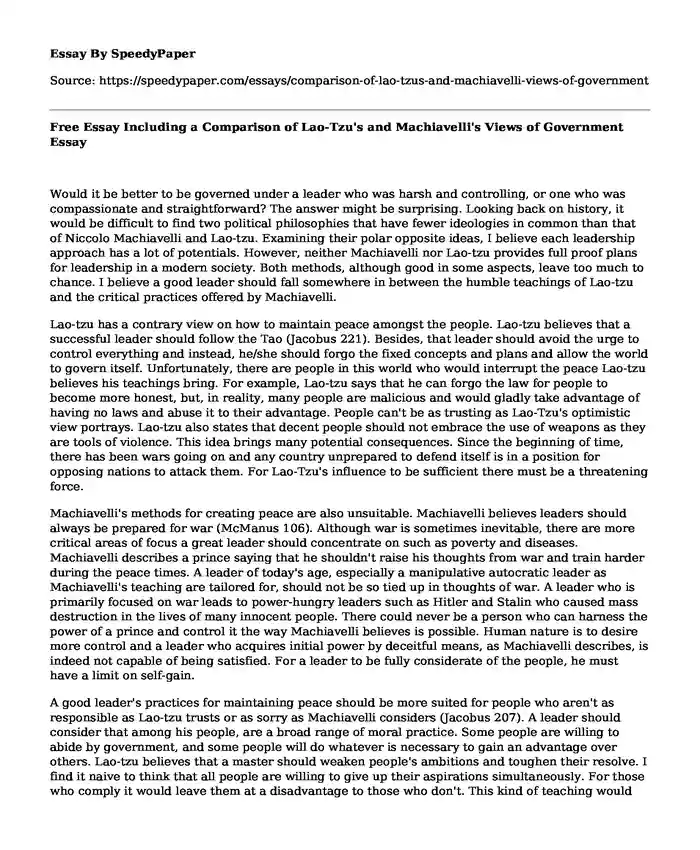
| Type of paper: | Essay |
| Categories: | Political science Government Philosophers |
| Pages: | 4 |
| Wordcount: | 850 words |
Would it be better to be governed under a leader who was harsh and controlling, or one who was compassionate and straightforward? The answer might be surprising. Looking back on history, it would be difficult to find two political philosophies that have fewer ideologies in common than that of Niccolo Machiavelli and Lao-tzu. Examining their polar opposite ideas, I believe each leadership approach has a lot of potentials. However, neither Machiavelli nor Lao-tzu provides full proof plans for leadership in a modern society. Both methods, although good in some aspects, leave too much to chance. I believe a good leader should fall somewhere in between the humble teachings of Lao-tzu and the critical practices offered by Machiavelli.
Lao-tzu has a contrary view on how to maintain peace amongst the people. Lao-tzu believes that a successful leader should follow the Tao (Jacobus 221). Besides, that leader should avoid the urge to control everything and instead, he/she should forgo the fixed concepts and plans and allow the world to govern itself. Unfortunately, there are people in this world who would interrupt the peace Lao-tzu believes his teachings bring. For example, Lao-tzu says that he can forgo the law for people to become more honest, but, in reality, many people are malicious and would gladly take advantage of having no laws and abuse it to their advantage. People can't be as trusting as Lao-Tzu's optimistic view portrays. Lao-tzu also states that decent people should not embrace the use of weapons as they are tools of violence. This idea brings many potential consequences. Since the beginning of time, there has been wars going on and any country unprepared to defend itself is in a position for opposing nations to attack them. For Lao-Tzu's influence to be sufficient there must be a threatening force.
Machiavelli's methods for creating peace are also unsuitable. Machiavelli believes leaders should always be prepared for war (McManus 106). Although war is sometimes inevitable, there are more critical areas of focus a great leader should concentrate on such as poverty and diseases. Machiavelli describes a prince saying that he shouldn't raise his thoughts from war and train harder during the peace times. A leader of today's age, especially a manipulative autocratic leader as Machiavelli's teaching are tailored for, should not be so tied up in thoughts of war. A leader who is primarily focused on war leads to power-hungry leaders such as Hitler and Stalin who caused mass destruction in the lives of many innocent people. There could never be a person who can harness the power of a prince and control it the way Machiavelli believes is possible. Human nature is to desire more control and a leader who acquires initial power by deceitful means, as Machiavelli describes, is indeed not capable of being satisfied. For a leader to be fully considerate of the people, he must have a limit on self-gain.
A good leader's practices for maintaining peace should be more suited for people who aren't as responsible as Lao-tzu trusts or as sorry as Machiavelli considers (Jacobus 207). A leader should consider that among his people, are a broad range of moral practice. Some people are willing to abide by government, and some people will do whatever is necessary to gain an advantage over others. Lao-tzu believes that a master should weaken people's ambitions and toughen their resolve. I find it naive to think that all people are willing to give up their aspirations simultaneously. For those who comply it would leave them at a disadvantage to those who don't. This kind of teaching would cause an imbalance between the people. Machiavelli's opinion of people is clear by saying that for one who practices good deeds at all times will ruin when among many regarded bad people. Essentially the reasons that to progress oneself he must be willing to throw away his morals and do what is necessary rather than what is ethical. If all people acted in this manner, society would create chaos among itself.
By examining the cases offered by Lao-tzu and Machiavelli, I believe a combination of both ideals, would be the most effective leadership method possible. A leader must be wary not to put too much emphasis on either side of the argument. There should be a balance between trust in the people and control over the people. An example would be a people who prepare for possible conflict but direct their focus on methods of improving their community rather than constantly worrying about the enemy as Machiavelli suggests. Another example of a combination between Lao-tzu and Machiavelli regarding the rule over people is how a leader should govern. Machiavelli believes tight control is the ideal way to impose power, while Lao-tzu believes people can control themselves without the need for force (Jacobus 267). By combining these two ideas, a leader could impose a limited amount of power while still allowing freedom to the pursuit of happiness.
Work Cited
Jacobus, Lee A. A World of Ideas: Essential Readings for College Writers. , 2017. Print.
McManus, Robert M, and Gama Perruci. Understanding Leadership: An Arts and Humanities Perspective. , 2015. Print.
Cite this page
Free Essay Including a Comparison of Lao-Tzu's and Machiavelli's Views of Government. (2022, Jul 14). Retrieved from https://speedypaper.net/essays/comparison-of-lao-tzus-and-machiavelli-views-of-government
Request Removal
If you are the original author of this essay and no longer wish to have it published on the SpeedyPaper website, please click below to request its removal:
- Free Essay Sample on Negotiation Management
- Free Essay on Raising Healthy Children
- Assignment Sample on Epidemiological Study
- Essay Sample: Improving My Managerial Communication Skills
- Communication Perception Essay Sample
- Paper Example on Why Online Classes are Better Than Traditional Classroom
- Paper Example: How the Iphone Impacted and Changed the TV and Movie Industry.
Popular categories




